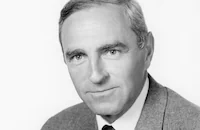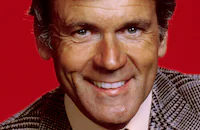These Thousand Hills
Cast & Crew
Richard Fleischer
Don Murray
Richard Egan
Lee Remick
Patricia Owens
Stuart Whitman
Film Details
Technical Specs

Synopsis
Albert Johnson "Lat" Evans, an earnest young cowboy determined to better his situation, wins a job with a cattle drive by busting a wild horse. Befriended by cowhand Tom Ping, Lat fantasizes about owning his own ranch and being rich one day, unlike his father, who died "broke, a failure." When the drive reaches a small Wyoming town, the cowboys congregate at the saloon, where Jehu, an unscrupulous rancher, proposes racing one of their horses against his swift steed. Lat accepts the challenge, and is in the lead when his opponent throws a blanket at his face, causing Lat to lose his balance and fall from his horse. Conrad, the town's upstanding banker, intervenes, however, and declares Lat the winner. That night, Tom and Lat celebrate with saloon girls Jen and Callie. With their winnings, they decide to leave the cattle drive and hunt wolves for their hides. After bidding his cowhand friends goodbye, Lat, feeling melancholy, gets drunk and visits Callie. When Lat recalls a traumatic incident from his childhood in which his father beat him for being alone with a girl in the woodshed, Callie feels empathy. Some time later, Lat and Tom's wolf hunting career ends in disaster when they find themselves snowbound in the dead of winter and their tempers flare. Denouncing Lat's lust for success, Tom dissolves their partnership and leaves. Now alone, Lat is approached by a band of Indians, who try to steal his horse. When he resists, the Indians shoot him, but Tom comes to his rescue and drives them away. Tom leads the wounded, delirious Lat through the frozen, barren wilderness to town, where Callie nurses him back to health. Restless and impatient to become successful, Lat asks Conrad for a loan to buy a ranch. After Conrad turns him down, Callie gives Lat her life savings to buy a piece of land, which he then uses as collateral for a loan to purchase a herd of cattle. Lat makes Tom a partner in the venture, and after a hard winter, Lat prospers while the other ranchers falter. As his fortunes improve, Lat begins to shun Callie for Conrad's niece Joyce. When Tom tells Lat that he plans to marry Jen, Lat questions his decision and calls Jen a tramp, causing Tom to angrily renounce their partnership. One night, while Lat is dining at Conrad's, the banker proposes that he enter politics by running for the school board. Callie, who has baked a cake for Lat, anxiously awaits his arrival, and when Jehu appears instead, she fights off his crude advances. After dinner, Lat goes to Callie's house and informs her that there is no place in his life for her. Soon after, Lat and Joyce are married and start a family. After Lat decides to run for U.S. Senator, he is visited by Jehu and rancher Frank Chanault, who use the promise of their votes to coerce him into joining a group of rancher vigilantes on the trail of some horse thieves. The ranchers corner the thieves at their mountain hideout, and after a gun battle, the two surviving rustlers surrender, and Lat is shocked to discover that Tom is one of them. After Tom confesses, he accuses Lat of worshiping the tin god of money. Jehu sentences Tom to hang, and when Lat protests that he be allowed to stand trial, Jehu knocks him unconscious and then hangs Tom. Riddled with remorse, Lat returns home and Joyce hands him a distress note from Callie. Although Joyce jealousy forbids Lat to see Callie, Lat contends that he owes her a debt and proceeds to her house. There, Lat learns from her servant Happy that Jehu has savagely beaten Callie. Outraged, Lat goes in search of Jehu. After finding Jehu at the saloon, the two begin to fight and their brawl spills onto the street as the townsfolk watch in consternation. Pulling a rifle from a saddle, Jehu aims it at Lat just as a gunshot fired by Callie rings out, killing Jehu. Later, at home, Joyce forgives Lat, and when he informs her that he intends to testify at Callie's trial, she graciously gives her consent.

Director

Richard Fleischer
Cast

Don Murray

Richard Egan

Lee Remick

Patricia Owens
Stuart Whitman

Albert Dekker

Harold J. Stone

Royal Dano

Jean Willes

Douglas Fowley

Fuzzy Knight
Robert Adler

Barbara Morrison
Ned Weaver
Ken Renard
Steve Darrell
Tom Greenway
Frank Lavier
Nelson Leigh
Ben Wright
Jesse Kirkpatrick
John Epper
Frank Kreig
Irene James
Capt. Fred Somers
Guy Teague
Theodore Lehman
Tom Steele
Ted White
Zon Murray
Fred Graham
A. Cameron Grant
Edmund Cobb
Walter Maslow
Crew
Chester Bayhi
Herman A. Blumenthal
Charles G. Clarke
Leonard Doss
William Eckhardt
Walter Fitchman
Hugh S. Fowler
Bernard Freericks
Leigh Harline
Alfred Hayes
Eddie Jones
Charles Lemaire
Harry M. Leonard
Hal Lierly
Scotty Mcewen
Lionel Newman
Ben Nye
Edward B. Powell
Joseph E. Rickards
Walter M. Scott
Jack Stubbs
Wesley Trist
Helen Turpin
Harry Warren
Ned Washington
David Weisbart
Lyle R. Wheeler

Film Details
Technical Specs

Articles
These Thousand Hills - Don Murray & Lee Remick in the 1959 Western - THESE THOUSAND HILLS on DVD
There's little rhyme or reason here. Aside from a flair for thrillers, Fleischer showed little consistent directorial touch, yet studios kept hiring to do other sorts of movies. Movies like These Thousand Hills. This 1959 release, new on DVD (its home video debut), wasn't Fleischer's only western, but a rare one. And a fairly undistinguished one, too. Based on a book by A.B. Guthrie, Jr., the western novelist and screenwriter (Shane), the Montana-set These Thousand Hills appears to be an attempt at a wide-reaching, Giant sort of epic that covers a big chunk of time and takes its characters through a rugged emotional journey. But, despite Fox giving it a widescreen CinemaScope treatment, the results are very half-hearted. At only 96 minutes, the would-be epic skips around like a rock tossed across the surface of a lake, while protagonist Lat Evans (Don Murray) hardly seems majestic, partially as a consequence of Murray's limitations and the story's superficiality.
Murray, known almost exclusively these days from his role opposite Marilyn Monroe in Bus Stop, tries, but he doesn't really have the charisma to put across Lat, the ambitious wrangler and bronc-buster who, after helping to drive his boss' herd to town, sticks around to pursue good-time gal Callie (Lee Remick) and his dream of having his own ranch. Lat's plan to overcome the harsh Montana winters by growing hay on his land and feeding it to his cattle in the winter works, and a year later he's one of the biggest ranchers and most-respected men in the area. But instead of making an honest woman out of Callie, he eventually takes up with the local banker's proper niece (Patricia Owens), betrays the fellow cowboy he'd made his partner (Stuart Whitman) and starts a political career.
Although there's external conflict here, mainly between Lat and Jehu (Richard Egan), the fellow rancher Callie pushed aside when Lat came along, it's internal conflict that's more important, leading to Lat's climactic evaluation of whether he likes his image-conscious "successful" self more than his old self. But These Thousand Hills is too shallow to get that deep into internal dilemmas. While there should be a truckload of passion between Lat and Callie, there isn't, because Murray and Remick have little chemistry together and because the movie never lets them get very physical (there's one post-coital conversation when he's lying in bed and she's brushing her hair, but they're both fully dressed). His obligation to her seems mostly because she gave him her savings to use as seed money for the ranch, after the local banker wouldn't give him a loan. The bond between Lat and Whitman's Tom unintentionally feels much more intimate (their horseplay wrestling is more physical than anything we see Lat and Callie get up to), and Whitman brings some needed fire to the story. Souring the story even more is an insincere resolution in which, after a climax forcing Lat to choose between his old integrity and the economic and emotional comforts of his new life, he (of course) chooses integrity yet, incredibly, loses little of anything in the process.
Of the three new-to-video 'Scope westerns Fox just released on DVD, this is definitely the least (The Last Wagon with Richard Widmark and The Proud Ones with Robert Ryan are the others). As on those discs, galleries of ads, posters and production photos provide the extras.
To order These Thousand Hills, go to TCM Shopping.
by Paul Sherman

These Thousand Hills - Don Murray & Lee Remick in the 1959 Western - THESE THOUSAND HILLS on DVD
Quotes
Trivia
Notes
Although a Hollywood Reporter production chart includes Harry Carter in the cast, his appearance in the released film has not been confirmed. A July 1958 Hollywood Reporter news item notes that Stuart Whitman's three-year old son Mike was to make his screen debut in the picture, but his appearance in the released film has not been confirmed. According to Filmfacts, location filming was done in Eastern Colorado.
These Thousand Hills was the last novel in A. B. Guthrie's trilogy of the old West. The Big Sky, the 1949 novel that launched the trilogy, was filmed in 1952. The middle installment, The Way West, which won a Pulitzer Prize, was filmed in 1967 (see AFI Catalog of Feature Films, 1961-70.) Time magazine noted that the novel These Thousand Hills examined "how the men who won the West settled down to manage their estates, and in the process turned from Buckaroos to Babbitts." Time criticized the film adaptation for reducing Guthrie's story to "the common place."

Miscellaneous Notes
Released in United States 1959
CinemaScope
Released in United States 1959













